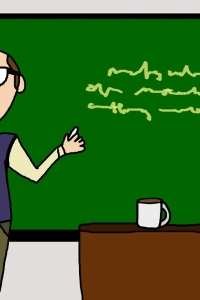
The English Teacher
“Sir, what you’ve explained is incorrect,” Rajiv said, closing his English literature textbook.
The word ‘incorrect’ rankled Sir Raghubir. This was probably the first time in his teaching career spanning twenty years that a lad of seventeen had questioned his proficiency. Trying to maintain his cool, for this was just the first day, Sir Raghubir made an attempt to fix the problem.
“Tell me, what’s wrong? Point out.”
“In the last four lines of the poem. What Tithonus -” the precocious student pointed out.
“Tell me the mistake,” Sir Raghubir interrupted in a stern voice.
Summoning courage, Rajiv explained as his schoolteacher had done.
After listening to him, Sir Raghubir said, “That’s correct. But I had gone deeper into the text, like they do at the M.A. level. Most teachers at the school level are not bothered about inner meaning. For the sake of examination, leave out what I said and reproduce what your schoolteacher stressed. After all, it is a matter of getting marks. I often face this problem of coming down to a basic level. Anyway, it is good that you informed me that your schoolteacher is also like that.”
Rajiv’s mother entered the study room with a plate of pakoras and chilli sauce. Sir Raghubir’s attention drifted to snacks. Asking the student to read the poem aloud once more, he busied himself with the spicy stuff.
“Why did you take this trouble? I am not fond of eating at any student’s place. Just a cup of tea would do.”
He held the plate in his hand when Rajiv’s mother lobbed a trite question that obstructed the good times to follow. True, all curious parents do that, but this lady had raised it on the very first day.
“Is he getting you? I believe your guidance will make him better. Put pressure on him.”
After what Rajiv had done, Sir Raghubir did not deem it fit to hide the boy’s bold style.
Asking the student to stop reading and instead find meanings from the dictionary, he began to discuss what was wrong with him.
“Actually he understands more than what is required. Brain is not bad. Needs to focus more...”
When Rajiv looked at him, he stopped and smiled at his mother.
“He is busy with cartoons, comics and story books all the time. His Uncle supplies him all that. You take care of his grammar. English is vital now. His schoolteacher does not like his writing style, does badly in the language paper. Board exam is not very far,” she said, expressing her concerns once again.
Sir Raghubir was beginning to enjoy her company and he wanted the conversation to roll. Rajiv had finished consulting the dictionary and he was looking for something to stay engaged with. Sir Raghubir understood it from his vacant look.
“If you have got all meanings, then compose an essay within 350 words on India in 2020 A.D.”
Sensing that her presence was hampering his study, she got up and said, “I will get tea for you.”
As she stood up to leave with the empty plate, a look of sadness descended on his face. There was nothing he could say to hold her back, not even a smattering of English and humour.
Sir Raghubir had maintained himself well; he wore jeans, T-shirt, with close-cropped hair covered with a cap. Many women drooled over him in the small town where fat men were found aplenty. Raghubir Sir took the opportunity to rub his hands with the curtain, thinking that the boy was busy with his exercise.
It was a known fact that Sir Raghubir was famous in Kendrapara. He served in the defence before 1971 war broke out. His father asked him to come back to look after their village properties. Since then, he had turned a teacher and married according to his father’s wishes.
Rajiv’s father had requested him to coach his son when they met at the local cadre meeting last month. He had come home to break the news to his wife that Raghubir Sir had agreed to come to his house to teach his son. Raghubir Sir had compiled an English-to-Bengali dictionary and also authored a book on English grammar that sold well in local trains. In fact, in his introductory note he had mentioned his achievements as a noted author to impress the new student.
He was looking at the door, expecting the lacy curtain to go up, with Rajiv’s mother entering with tea. He heard footsteps and looked up. This time an old lady cook came to serve tea, a disappointment could be read in his command to the young boy to complete the exercise. He polished off the cardamom tea and demanded to see the work.
“Show me whatever have you written.”
“Not complete yet.”
He cast a look at the antique wall clock and said, “Getting late. I must leave. Finish it and show me the next day. Homework. Today is Friday, so next Monday. Twice a week I will come. Ok.”
*
Raghubir Sir put on the helmet and kicked his scooter. Rajiv stood on the verandah and watched him perform the heroic job. He rode off splashing muddy water.
As Rajiv entered the house, she asked him restlessly, “How did you like him?”
“And you?” Rajiv shot back.
“Am I the student or you? Answer properly,” she scolded him.
“So you hate my studying comics and story books,” Rajiv complained.
“Teacher I asked,” she repeated, “Answer that first.”
“No, I didn’t like him,” he replied rudely.
“I knew it. The third one in seven months. You were not like this earlier. Your father will say my love has spoiled you. Where do we get teachers of your choice in this town? He is the best,” she said with emphasis.
“But he gave wrong explanations. He was not prepared,” Rajiv alleged.
“Wrong! He has written books and you say he teaches incorrect. Your father will break your bones if he hears this. Did you misbehave with him?”
“I just said my teacher at school explained differently.”
“And you argued on this?” she asked with worry.
“Not really,” he said, looking at the tiled floor.
“Ma, he rubbed his hands using the curtain. You always scold me for doing that,” Rajiv said, to sully the teacher’s image.
“This habit of finding faults with others will do you no good. First look at yourself. How perfect you are,” she said, “and did you write the essay?”
“Incomplete.”
“Always slow. Where’s your mind these days?”
“Conversation does not let me concentrate.”
“Always ready with excuses. Now you can write it. Drink milk and sit down.”
“Put some cardamom in it, Ma.”
She understood why he wanted that today.
“Rajiv, I am warning you. I want no complaints this time. Mend your ways. Otherwise you will not get a tutor. Remember that.”
Rajiv was afraid that the blame would fall on his shoulders, as he was a problematic child in their eyes. Academically he was average, getting 60 percent marks in English. Rupali and Sanjoy scored 82, 85 in English but they never bragged about their knowledge.
During the weekend he had completed the essay and prepared a fair draft, showing his diligence to his mother who was pleased to see the neatness.
“Let us see what Sir says about this,” she said, making it clear that everything depended on the teacher’s response.
On Monday, Rajiv showed him the homework first. Sir Raghubir placed his reading glasses on his undulating nose. Three pages in long hand he read. Then he borrowed a red pen and marked out some lines and cancelled out some paragraphs. This brutalized piece, with red ink all over the sheets, was an unbearable sight. Rajiv believed he had composed a fairly good piece. He was given 10 marks out of 20. Raghubir Sir put his flamboyant signature near the margin and handed over the copy to him.
After seeing the mess, Rajiv raised the obvious question, “What is wrong in this?”
“I have marked it all. Read carefully.”
“But what is the correct thing?”
Rajiv insisted on the right way to express. His ego was pricked.
“My dear, learn to accept criticism in the right spirit. It is not a personal attack. I want you to improve, so that you reach my standards some day. Your sentences are all broken, your language pedestrian and choppy. Your ideas are depressing. India is growing. There is development. Go to the banks and you see computers. You have insulted the nation. You misunderstood the topic.”
“But there are starvation deaths and land grabbing, Sir,” Rajiv pointed out.
“See this is argumentative tendency. Learn to respect your teacher’s views. I have seen more life than you.”
Raghubir Sir was pretty loud. The cook’s entry with a cold drink was a timely deflection. He took the drink and asked him to rewrite. When his temper cooled down after a couple of sips, he offered a few clues.
“You tend to get poetic at times. Remember the rules of essay writing...”
Rajiv was not interested anymore. He had filched some expressions from V.S Naipaul’s India: A Wounded civilization. A book his Uncle had presented to his father on his birthday but he had never read even a page of it.
When the critique was offered Rajiv maintained a stiff upper lip. He controlled the urge to reveal the source of his ideas. What Raghubir Sir had cancelled out was written by an author of international standing.
His mother barged in with salty snacks, to know how he had assessed Rajiv’s writing style.
“Actually you see his language is weak. He needs to read a lot, a very good essay book by my ex-colleague, Tuhin Ray he should start with. He will get good points from there, also a wide range of topics. All class 12 students follow it before exams. A bit costly – Rs 130,” Sir Raghubir quipped.
“Money is not a factor. We want him to develop well. We know he has the bad habit of arguing. Please overlook if he does it in your presence,” she said apologetically.
He ordered Rajiv to write the name and the publisher. He scribbled it on a rough page, revealing scant interest in it.
Seeing Rajiv’s mother worried, he comforted her with interest.
“Strange, rotten ideas formed during impressionable years have to be flushed out of his system first. I will make that happen soon. His father is a good friend of mine and I have a certain responsibility on account of that.”
These reassuring words brought a flush of red to her cheeks.
Rajiv could not bear the insult to the great author.
“Sir, what you have not liked is not my output. It’s Naipaul’s. You need to read such works to develop ideas, I believe,” he burst out finally.
Sir Raghubir was flummoxed.
“That’s the way you speak to teachers,” his mother said and lunged forward.
Raghubir Sir got up in a huff and exploded, “Excuse me, Mrs Sethi, I cannot be treated with such arrogance by a mere schoolboy. What does he think about himself? Only he has read Rushdie and Naipaul.”
His mother tried to stop his exit but he was already at the doorstep.
“Please come back. Forgive this ignorant fool,” she said repeatedly.
Rajiv had come out to see the spectacle, how quickly he had chased away an incompetent and lecherous teacher. She found him smirking in a corner. She boxed his ears, slapped him, just to show the teacher that she was strict and merciless. This outburst had no positive effect on Raghubir Sir; he kicked his scooter and sped off, the anus of his mean machine releasing a cloud of black smoke.
She was afraid that her husband would scold her if Raghubir Sir reported this matter to him, the way it happened.
In order to save herself from his wrath, she shared everything that took place in the evening. At night, Rajiv was scolded by his father. It began with a series of rapid fire salvos and degenerated to slaps.
“Why did you misbehave with Sir? Why did you test his knowledge? Who are you to do so? He is a senior teacher, the best around us.”
Rajiv’s mother confessed she had beaten the boy so he did not pull out his leather belt. Otherwise it would have been very tortuous for Rajiv.
The poor fellow stood silent in a corner without offering any explanation in defence of his action. They blindly supported the teacher. His point of view would carry no value.
Rajiv wept that night thinking how he could prove that he was not worthless. While going through the newspaper, the scope of writing something for the newly introduced children’s section caught his fancy. He wrote a short story in three days and sent it to the daily. When it was published, he showed it to his parents who for the first time thought that their son knew English.
His mother asked with concern, “Is it your own. Not copied. Sure?”
The usual look of suspicion floated in her eyes. The proof of his potential was something she could not deny.
“No, it’s mine,” he held the supplement close to his chest, “otherwise they would have rejected it.”
“Have Rupali and Sanjoy been published here?” she asked with hope.
“No. Never,” he replied proudly.
*
Rajiv’s father was happy. His son was the first member in the family to have been published. Rajiv showed his piece to friends and teachers; circulated the copy everywhere around to spread his byline. As the name of the school was also printed along with the piece, the Principal felt proud of his achievement. Rajiv was summoned to the office and advised to write more, pen a piece to praise his school, teaching standards and infrastructural facilities. His story stayed pinned up on the bulletin board for several weeks. All schoolteachers admired his content.
Raghubir Sir got to know about Rajiv’s maiden achievement. He said to a common friend to gain mileage, “I taught that boy and improved his writing. He often made me see his essays and letters and stories and I checked them all, rectified mistakes, almost rewrote them.”
Rajiv’s mother heard this from her friend, Mala, whose daughter was now getting lessons from Sir Raghubir. She laughed it off, feeling more confident of her son’s proven talent.
“Your daughter will also become brilliant soon,” she said, a bit sarcastically.
In the annual examination Rajiv’s score took a big leap. He clocked 86 in English. Parents were glad that without any tuition he could achieve a score like that.
When the report card was handed over, he walked up to the class teacher’s desk – who was also the English teacher – and said, “Sir, I do not deserve 86. How could I get it when I have attempted only 80 marks? There must be some mistake in the calculation.”
The entire class broke into peals of laughter.
The teacher looked grim, “Your English has improved. And you have got full marks in every question.”
“But I always wrote like that. Why more marks this time?” Rajiv asked with an innocent face.
The class teacher was unable to say anything.
“It is because of your short story, bonus gift, our writer friend,” some boys whispered in the class.
The bell rang and saved the teacher from further ridicule. Rajiv sat down thinking of another plot, another twist in the tale for his next story.
_____________
About Author:
Devraj Singh Kalsi works as a senior copywriter in Kolkata. His short stories and articles have been published in Tehelka, Earthen Lamp Journal, The Bombay Review, Open Road Review, The Assam Tribune, Deccan Herald, Femina, The Pioneer, and The Statesman. His first novel, Pal Motors, is getting published this year.
_______________
About the Author







Comments